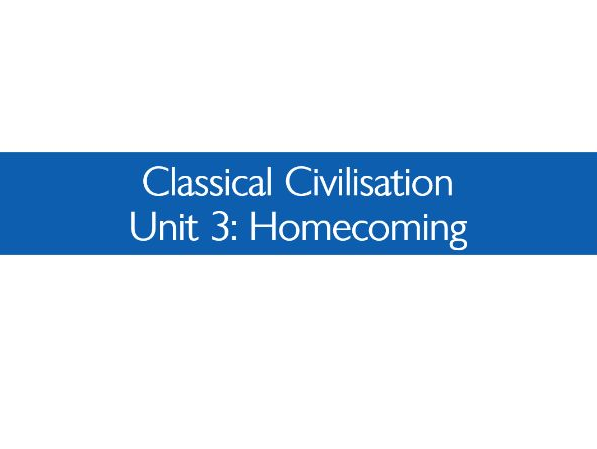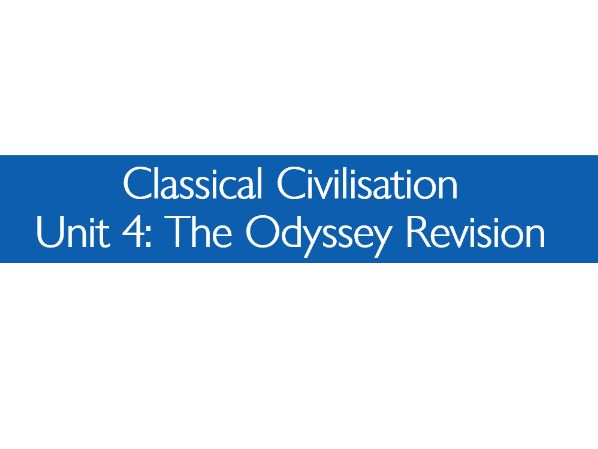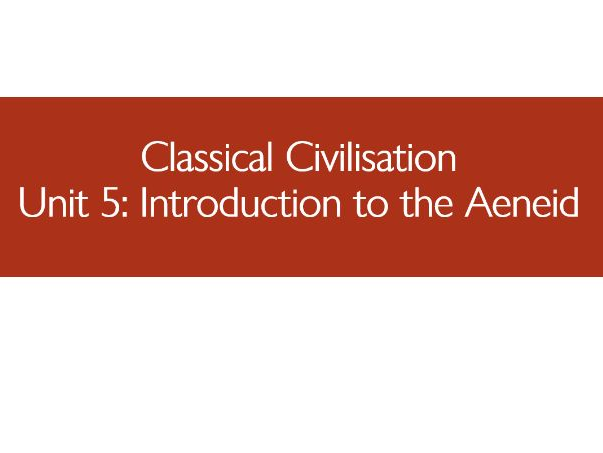19Uploads
2k+Views
5k+Downloads
Classics

Classical Civilisation A-Level Unit 1: Gods, Heroes and Monsters (Full Half-Term Unit)
In this 14- lesson unit, students study a broad range of Greek myths from the myth of Creation to the aftermath of the Trojan War. This gives students the opportunity to understand the historical context of Classical Greece, read the works of classical writers such as Hesiod, Ovid and Homer, identify common tropes in Greek myth, and familiarise themselves with the gods that later appear in Homer’s Odyssey, such as Zeus, Athena, Hades, Hermes, and Poseidon.
At the end of the unit, students will complete an assessment on Greek heroes, focusing on an extract about Achilles from The Iliad.

Classical Civilisation A-Level Unit 2: The Wanderings of Odysseus (Full Half-Term Unit)
In this 16- lesson unit, students begin to read and analyse the first half of the Odyssey. The scheme gives opportunity to study the key plot points, characters, settings and historical context, as well as Homer’s structural and linguistic features. This unit also introduces scholars and their theories on the text.
Halfway through this unit, there is a mock assessment. This is a Question 3 and 4 on Polyphemus and Xenia.

Classical Civilisation A-Level Unit 3: Homecoming (Full Half-Term Unit)
In this 13-lesson unit, students read and analyse Books 13 to 20 of The Odyssey. They study the themes of nostos, divine intervention, heroism, xenia, and the supernatural. Students revise the concept of the Homeric hero, contrast modern and classical ideas of heroism, and explore key episodes such as Odysseus’ return to Ithaca, his reunion with Telemachus, and his disguises. They engage with critical scholarship on divine influence, monsters, and Odysseus’ character, including work by Griffin, Peter Jones, Ruth Scodel and others. Lessons encourage close reading, thematic discussion, and preparation for 10- and 20-mark exam responses.

Classical Civilisation A-Level Unit 4: The Odyssey Revision (Full Half-Term Unit)
In this 12- lesson unit, students read and analyse Books 21 to 24 of The Odyssey. Students revise the theme of justice, study the minor gods (Helios, Aeolus, Hermes and Ino), read scholarship on fate versus autonomy, examine the central themes of nostos and oikos, and compare the loyal and disloyal characters on Ithaca. Students will also practice 30-mark essays on divine intervention, justice and family, using sources and scholarship. The final lesson is an introduction to the historical context for the Aeneid.

Classical Civilisation A-Level Unit 5: Introduction to the Aeneid (Full Half-Term Unit)
In this 11-lesson unit, students are introduced to the Aeneid and explore the historical, political, and literary context of Virgil’s epic. They study Books 1–3 in depth, analysing the characters, themes, and propaganda elements within the poem. Key focus areas include Aeneas’ piety, the fall of Troy, the divine machinery, and Aeneas’ wanderings across the Mediterranean. Students examine Roman values, reflect on how Virgil mirrors Homeric epics, and engage with early analysis tasks designed to prepare them for extended writing and thematic interpretation.





